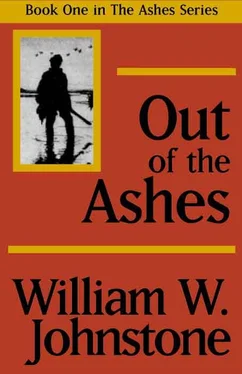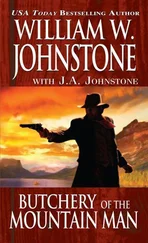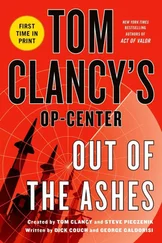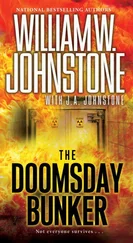Almost with the speed of a striking snake, Tina kicked high with her foot, catching Barney on the side of the face. He slammed backward against a wall, then recoiled forward, stunned at the suddenness of it all. With no change in her expression, Tina slashed out with the knife edge of her hand and slammed a blow just above his kidney, then slapped him on the face a stinging pop. Barney dropped to his knees, his back hurting, his face aching, blood dripping from a corner of his mouth. He rose slowly to his feet, his face a vicious mask of hate and rage and frustration and disbelief.
“You bitch!” he snarled. “You rotten little cunt.”
Roisseau laughed. “Now, you are in trouble, hotshot.”
Barney shuffled forward, in a boxer’s stance, his chin tucked into his shoulder. He swung a wide looping fist at Tina. She smiled at his clumsiness and turned slightly, catching his right wrist. Using the forward motion of his swing against him, and her hips for leverage, she tossed the man over her side and bounced him off a wall. Quickly reaching down, her hands open, on either side of his head, Tina brought them in sharply, hard, slamming the open palms over his ears at precisely the same moment. Barney screamed in pain and rolled in agony on the floor, a small dribble of blood oozing from one damaged ear.
Tina smoothed her hair. She was not even breathing hard. She looked at Master Sergeant Roisseau. “Did I do all right, Sergeant?”
The reporters then noticed the flap of Roisseau’s holster, lying on the desk, open, the butt of the .45 exposed. And all were glad no one had tried to interfere.
Then, from the floor of the reception center, came the battle cry of urbane, modern, twentieth-century man. Unable to cope with a situation, either mentally or physically, or because of laws that have been deballing the species for years, man bellows the words:
“I’ll sue you!”
The room suddenly rocked with laughter. News commentators, reporters, camera-people and sound-people; people who, for years, had recorded the best and worst of humankind, all howled at the words from their colleague.
“Sue?” Clayton managed to gasp the word despite his laughter. “Sue? Sue a little teen-age girl who just whipped your big, manly butt. Really, Barney! I’ve warned you for years your mouth would someday get you in trouble.”
Roisseau spoke to the girl still behind the desk. “Judy, get on the horn and call the medics and tell them we have a hotshot with a pulled fuse.” He faced the crowd of newspeople.
“You’re all due at a press conference in two hours. Meanwhile, I’d suggest you all help yourselves to coffee and doughnuts and soft drinks and study the pamphlets we have for you.” He glanced at Barney, sitting on the floor, moaning and holding his head in his hands. “As for you, I’d forget about suing anyone. Our form of government discourages lawsuits. You’d lose anyway.”
“I’ll take this to the Supreme Court!” Barney yelled.
“Fine. Governor Raines is someday going to appoint one for us. Next twenty or thirty years. We don’t recognize yours.”
“Well, who is the final authority on Tri-states law?” a woman asked.
Roisseau smiled. “Just about anyone in the area… over the age of ten. As you study the simplicity of our judicial system, you’ll see what I mean. We don’t use any Latin base or legal double-talk. It’s all in very plain English. If you’re asking who would make the final decision on an issue—if it ever got that far—Governor Raines and half a dozen people whose names were pulled out of a hat.”
“Well, that’s the damnedest form of law I ever heard of in my life!” Larry Spain said.
“I’m sure that’s true,” Roisseau said. “But what is important is that it works for us.” He walked back into his office, closing the door.
Moments later, the medics came in and looked at Barney. They said he had a split lip, several bruises, a slightly damaged eardrum—nothing serious—and a severely deflated ego. They sat him in a chair, told him to check into any clinic if he began experiencing dizzy spells, patted him on the head, told him to watch his mouth, and left, chuckling.
“Very simple society we have here,” a reporter observed. “Live and let live, all the while respecting the rights of others who do the same. Very basic.”
“And very unconstitutional,” another remarked.
“I wonder,” Judith mused aloud. “I just wonder if it is.”
“Oh, come now, Judith,” Clayton said, shaking his head. “The entire debate is superfluous. There is no government of Tri-states. It doesn’t exist. The government of the United States doesn’t recognize it. It just doesn’t exist.”
Several Jeeps pulled into the parking area. The reporters watched a half-dozen Rebel soldiers—male and female, all in tiger-stripe—step out of the Jeeps. The soldiers were all armed with automatic weapons and sidearms.
“Really?” Judith smiled. She pointed to the Rebels. “Well, don’t tell me Tri-states doesn’t exist—tell them!”
Before leaving the reception center, each member of the press was handed a pass marked: VISITOR—PRESS. It was dated and signed by Roisseau.
“Don’t lose those passes,” he cautioned them. “You people don’t have permanent papers with prints, pictures, and serial numbers. Our equivalent of social security.”
“Why are those papers necessary?” a reporter asked.
“We’ve given asylum to many so-called criminals from bordering states. Some of the police from those states have tried to come in after them, undercover, slipping in without our knowledge. They didn’t make it, but it did force us to go to a permanent ID.”
“I don’t… quite understand.” Judith looked up from the pamphlet she’d been reading. She was very interested in this state. “What kind of so-called criminals?”
“As you have probably read, or heard, our laws are different from yours. Very different. In other states, if you were to shoot a punk trying to steal your car, your TV set, or whatever, you would be put in jail and charged. Not here. There is a full investigation, of course—we’re not animals—but we do believe that a punk is a punk, and that a person has the right to protect what is his or hers from unlawful search or seizure. Using any authorized weapon.”
“How many children have been shot?”
“None. Our children are taught, not only in the home, but in public schools, the difference between right and wrong—as we see it.”
“You said authorized weapons…?”
“Rifle, pistol, knife, hands, fists, feet… whatever is available. Our citizens”—he smiled—“do not possess nuclear weapons.”
Barney shuddered. He had discovered how swiftly events could occur in this state. All over a little joke.
“Explain those permanent IDs,” Roisseau was asked.
“Each ID is numbered, the same number is on the person’s bank account, driver’s license, home title. That number is placed in a central computer bank. Along with the number is placed the person’s vital statistics. It’s very easily checked and almost impossible to hide an identity.”
“What comes next, Sergeant: tattooing at birth?” It was sarcastically put.
Barney resisted an impulse to tell the reporter to please watch his mouth.
Sergeant Roisseau smiled patiently. “No, sir, it’s past 1984. Your government is the one who turned on its law-abiding, taxpaying citizens, not ours.”
“What is the penalty for carrying a false ID?”
Roisseau’s eyes were chilly as he said, “It’s unpleasant. I hope you all have a nice stay in our area. It will be as nice as you make it.”
A member of the armed forces of Tri-states rode in each van and bus. As they pulled out of the reception center, a soldier rose and faced Clayton Charles’s group.
Читать дальше












